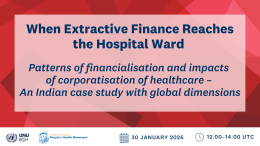Accelerating Change: The Potential of Capital Market Actors in Addressing Modern Slavery is a collaborative effort between UNU-CPR's Finance Against Slavery and Trafficking (FAST) initiative, the Bingham Centre for the Rule of Law, and the UK Modern Slavery and Human Rights Policy and Evidence Centre (Modern Slavery PEC). It offers insights, best practice examples, case studies, and five actionable recommendations to empower Capital Market Actors to address modern slavery in their value chains.
Publication comes at a time when the convergence of various factors – including the climate crisis, escalating conflicts, displacement of populations, and the disproportionate impact of COVID-19 on vulnerable communities – has left many desperate for employment or income-generating opportunities, thus placing them in risky situations vulnerable to exploitation.
Accelerating Change reveals that modern slavery awareness is not uniformly integrated into Capital Market Actors‘ strategies due to a lack of understanding. It emphasizes the importance of senior-level commitment and board oversight for addressing social risks and argues that investors' active engagement is a powerful lever to influence investee behavior. However, challenges persist, including the need for a better grasp of the 'S' in Environmental, Social, and Governance (ESG) reporting, concerns about data availability and reliability, and inconsistent approaches to governance.
The five actionable recommendations put forward to accelerate change are:
- Improve awareness and understanding of modern slavery risks and their relationship to ESG priorities.
- Develop dedicated social policies in alignment with international human rights and labour standards and principles.
- Incorporate Human Rights and Environmental Due Diligence processes throughout the investment life cycle.
- Increase collaborations with other Capital Market Actors to increase leverage, capitalizing on shared resources and building each other’s capabilities.
- Partner with modern slavery knowledge experts, civil society organizations, workers’ rights organizations, and survivors to obtain actionable data.
Taken together, these recommendations provide a strategic framework to not only mitigate modern slavery risks but also champion positive change in high-risk sectors.
Access 'Accelerating Change: The Potential of Capital Market Actors in Addressing Modern Slavery' here.
Suggested citation: Accelerating Change: The Potential of Capital Market Actors in Addressing Modern Slavery : UNU-CPR, 2023.



